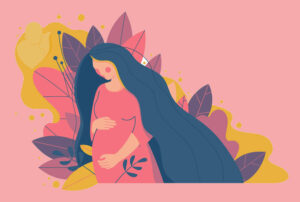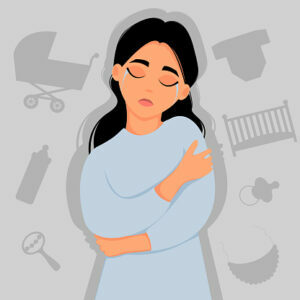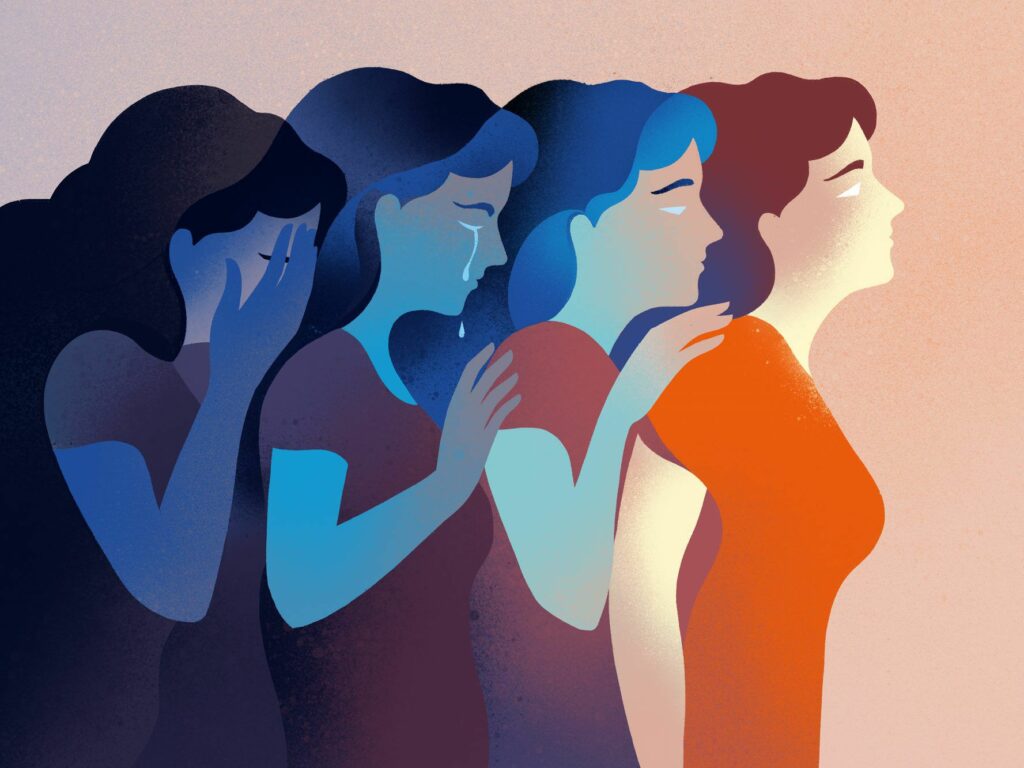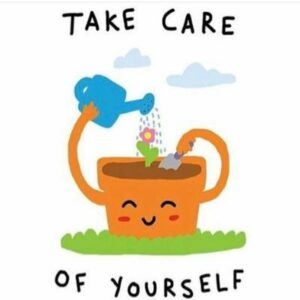Miscarriage is one of the most heartbreaking experiences a woman can go through. Not only is there the physical pain and healing process to deal with, but there is also the emotional impact that can be long-lasting. Miscarriage depression can be very difficult to cope with, especially if you don’t know where to turn for help. In this blog post, we will discuss the symptoms of miscarriage depression and offer some tips on how to cope with the emotional aftermath.
Contents
Miscarriage And Depression
 Miscarriage means the loss of a pregnancy and it usually occurs when the baby does not develop normally in the womb. Depression after miscarriage is common, affecting many women who miscarry. The loss of early pregnancy is a shocking and traumatic event for a woman and her family.
Miscarriage means the loss of a pregnancy and it usually occurs when the baby does not develop normally in the womb. Depression after miscarriage is common, affecting many women who miscarry. The loss of early pregnancy is a shocking and traumatic event for a woman and her family.
Miscarriage usually causes a period of intense emotional stress. Due to such a traumatic phase of life, some lingering psychological concerns remain forever. It is important to pay attention to depression and anxiety in people who have lost their babies.
Further, society may not realize the importance of loss to parents. Traditionally, when a death occurs, the family can openly mourn their loss and receive months of support. With miscarriage, however, the loss is sudden and often unexpected, and women may not share the fact that they are pregnant, leaving them to grieve alone, and socially isolated thus depression traps them cautiously.
Common Feelings After Miscarriage
 Many parents-to-be forms an attachment to their baby early in pregnancy. This is normal and natural. So, after the miscarriage, parents may be going through a period of grief, especially the mother. Some experience the same stages of grief that accompany the death of a loved one. These phases are:
Many parents-to-be forms an attachment to their baby early in pregnancy. This is normal and natural. So, after the miscarriage, parents may be going through a period of grief, especially the mother. Some experience the same stages of grief that accompany the death of a loved one. These phases are:
- Denial: Refusal to believe what happened.
- Anger: Blaming yourself or others for the loss.
- Bargain: Negotiate with yourself or God to get things back to normal.
- Depression: Feelings of lethargy, tiredness, hopelessness, guilt, punishment, and/or as if there is no satisfaction or joy in life.
- Acceptance: The realization that life must go on and the return of energy and purpose for the future.
Not only females but the whole family suffers from miscarriage depression which creates such a phase of life more difficult. Anyone can experience any stage of grief mentioned above. Coming out of such sorrow is necessary as remaining in that state may bring irrationality within which hampers life.
Symptoms Of Depression After Miscarriage
It is normal to feel deep sadness and grief after a miscarriage. In some women, these feelings can lead to depression. Depression, also known as major depressive disorder, is a mental illness that causes persistent and intense feelings of sadness over a long period. Here are a few symptoms:
- feeling sad or hopeless
- losing interest or enjoyment in most or all regular activities
- feeling very tired and having no energy
- sleeping too little or too much
- changing diet
- feeling anxious and restless
- feelings of worthlessness or guilt
- having trouble focusing, remembering things, and making decisions
- thinking about death or suicide
- having random pain that doesn’t go away, even after treatment
These are the common symptoms of miscarriage depression that you can have after going through a difficult phase of life.
Causes
 Miscarriage depression is caused by several unknown and known factors, such as:
Miscarriage depression is caused by several unknown and known factors, such as:
- Loss of control: A miscarriage can feel like you have no control over your body
- Grief: You may be grieving the loss of your baby
- Anger: You may be angry at yourself, your partner, or God
- Anxiety: You may worry about miscarrying again or have other pregnancy fears
- Guilt: You may feel guilty that you did something to cause the miscarriage
- Loneliness: Withmiscarriage being such a taboo topic, you may feel isolated and alone.
These are just some of the emotions you may experience after a miscarriage which leads to dreadful depression further. If you had a miscarriage and are struggling to cope with it, you may be at risk of miscarriage depression.
Implications On Life
 Miscarriage can be a stressful life event. In such cases, it is possible to experience psychological and emotional reactions. Some individuals may feel relieved that they have made the right choice for them and taken steps to resolve a difficult situation, while others may experience various negative emotions.
Miscarriage can be a stressful life event. In such cases, it is possible to experience psychological and emotional reactions. Some individuals may feel relieved that they have made the right choice for them and taken steps to resolve a difficult situation, while others may experience various negative emotions.
Loss of pregnancy causes disturbances in the hormonal cycle. The negative feelings that arise after the termination of a planned pregnancy can at least be a consequence of hormonal changes, which are similar to those that occur after the loss of an unplanned pregnancy. Some common negative feelings include:
Sadness And Grief
It is common to feel immense sadness and grief after miscarrying. You feel a connection with your baby during pregnancy and a sudden miscarriage turns into deep grief or sadness. This can be accompanied by crying spells, insomnia, and changes in appetite.
Anxiety
Anxiety is another common emotion experienced after miscarrying. Women may worry about their ability to have another child or whether they will have another miscarriage. Some may even worry about the physical pain they experienced during the miscarriage. All of these worries can lead to anxiety and depression.
Anger
Anger increases after miscarriage too much as it is a natural feeling to want to take out your miscarriage on someone else. You might find yourself being angrier with your partner, friends, or even strangers. It is very important to try and keep a lid on your anger as much as possible and to find constructive ways to deal with it.
Embarrassment
The feeling of embarrassment increases after a miscarriage due to the natural way people will look at you when they know what has happened. You will want to keep the miscarriage a secret and feel ashamed that you have failed in some way. You may be tempted to withdraw from friends and family and the resultant isolation will only increase depression.
Loss Of Self-Esteem Or Confidence
Self Confidence is lost after miscarriage. It is hard to feel good about yourself when you have just lost a baby. You may feel that your body has betrayed you. After miscarrying, you may start doubting your abilities as a mother and feel like you are not good enough. It is important to remember that a miscarriage is not your fault because it is not caused by anything you did or didn’t do.
Feeling Isolated
You feel lonely often after a miscarriage which makes it difficult to connect with others. the isolation increases because people do not talk about miscarriage as openly as other topics. It is easy to feel isolated and alone after miscarrying because it is not a topic that is often talked about openly. This can lead to feeling like you are the only one who has gone through this experience.
Nightmares And Sleep Issues
You witness a lot of nightmares after miscarriage. It becomes tough to fall asleep due to which you feel anxious and stressed. It further leads to insecurity. You might start to feel like your body is failing you. All these changes in emotions can lead to a feeling of depression after a miscarriage.
Relationship Problems
You may feel disconnected from your partner. Many important relations are worsened after miscarriage and it is hard to find emotional support and which becomes a big problem. The feeling of being disconnected can make it difficult to find comfort and understanding. You may feel like you are losing your grip on every closed relationship and that everything is happening too fast.
Guilt
Many women feel guilty after miscarrying, even though they did nothing wrong. They may blame themselves for not being able to carry the baby to term, for not being careful enough, or for doing something that they think might have caused the miscarriage.
The above-described implications are the common consequences of miscarriage and depression. Proper care has to be taken to heal from the mental and physical pain quickly to get back to normalcy.
Strategies To Cope With Miscarriage Depression
After a miscarriage, you may feel like you have failed or that your body has let you down. It is important to understand that these feelings are normal and there is help available if you are struggling to cope. Grief can last from less than a month to a year or more, depending on the circumstances of the miscarriage. At first, the feeling is intense and all-encompassing. But as time went on, they began to give up, giving way to a period of peace, prosperity, and finally acceptance. While there’s nothing you can do to “speed up” the grieving process, there are some simple things you can do to care for yourself while you’re recovering:
Psychotherapy
 One of the most effective ways of dealing with miscarriage depression is through psychotherapy. It can help you to understand and process your emotions, as well as give you practical tools for coping with depression. If you are struggling with miscarriage depression, don’t hesitate to reach out for help.
One of the most effective ways of dealing with miscarriage depression is through psychotherapy. It can help you to understand and process your emotions, as well as give you practical tools for coping with depression. If you are struggling with miscarriage depression, don’t hesitate to reach out for help.
- Psychotherapy can reduce miscarriage-related depression by teaching patients how to process their emotions related to the loss. It also provides practical coping tools to help patients manage depression.
- See a therapist or counselor who specializes in grief and loss. Referring to psychotherapy will help you deal with your emotions and deal with your grief in a healthy way.
Mantra Care also provides mental health therapies. Book your first free consultation online to seek aid. They will assist you in the best possible way.
Medications
Antidepressants help balance chemicals in the brain and relieve symptoms of depression. Consult your doctor first. He or she can help you decide if medication is right for you. However here are some examples of antidepressants:
- Celexa (citalopram)
- Lexapro (escitalopram)
- Prozac (fluoxetine)
- Zoloft (sertraline
Some Tips For Self Care
You can follow some natural remedies to get rid of depression after miscarriage. Such tips can give you relief from the problem you are facing in the most difficult phase of life. Some worthy care tips are described below:
 Do Communicate
Do Communicate
Communication is very important after a pregnancy loss. Often, partners feel guilty, and sometimes they blame each other. Usually, one or both partners may avoid talking about the loss, which makes the grief feel even more lonely. This separation can further exaggerate symptoms of isolation, so couples should try to maintain physical contact and intimacy by scheduling meetings and time together.
Read Stories
Read stories of other couples who have had miscarriages. It helps in finding ways to deal with post-miscarriage depression. Stories about couples who have had a miscarriage will give you tips on how to deal with loss.
Don’t Be Sorry
Don’t apologize for your pain. During your healing process, friends and relatives may pressure you to “keep going,” “forget things,” or “get back to normal.” But don’t feel like that until you’re ready. Your pain is a normal response to a deep loss you have suffered, and you don’t need to blame yourself or apologize to anyone for how you feel.
Ask for Help In The Household
While you are recovering from a miscarriage, ask friends and relatives to help you with household chores, such as doing laundry, housework, or cooking. It can take time for you to recover physically and emotionally, and this can help relieve some of your daily responsibilities.
Write About Your Feelings In A Journal
This is another way to help with the healing process and it is to write about your miscarriage in a journal. This can be a private journal that no one else sees, or you may choose to share your story with others who have experienced miscarriage. Writing about your miscarriage can help you make sense of your emotions and healthily release them.
Spend Time Outdoors In Nature
Spending time outdoors has been shown to help reduce depression after miscarriage. It is found that women who had miscarried and spent time in nature had lower levels of depression than those who didn’t and thus if you’re feeling down after a miscarriage, spend some time outside to help you feel better. Go for a walk in the park, sit in your backyard, or just spend some time near a window with natural light. Anything that gets you closer to nature improves your mood.
Take Sufficient Sleep
Those who experience a miscarriage often sleep less than six hours per night in the week after their miscarriage due to which they are more likely to report depressive symptoms than those who sleep more. Given the high rates of sleep problems and depression after a miscarriage, it is important to make sure you are getting enough rest.
Exercise To Elevate Mood
If you’re struggling with miscarriage depression, getting moving may help. It doesn’t have to be a hardcore workout—even a moderate amount of activity can make a difference. Taking a brisk walk around your neighborhood or going for a swim are great ways to get started. And there are plenty of other activities you can try, too. Just find something that you enjoy and that gets you moving.
Think New Events And Holidays
Pregnancy dates or due dates can also be painful, and you may feel sadder than usual at that time. So, it is necessary, to take time off, do prayers, or mark your dates to spend some time on vacation. It will elevate your mood.
These are some of the self-care strategies that one can choose and implement to heal from the traumatic phase of life. Practicing and remaining consistent may help you reduce your depression after miscarriage with the passage of time.
Conclusion
In the end, it is concluded that depression after miscarriage is not to be taken lightly. They are very real and can have a profound impact on a woman’s life. Miscarriage depression should be treated just like any other form of depression. With the proper support, women can overcome this difficult time.
If you or someone you know is struggling with miscarriage depression, there is help available. Don’t hesitate to reach out to a mental health professional for support. You are not alone in this journey. Others have been through this and come out the other side stronger and more resilient and so you can too.
Miscarriage depression doesn’t have to define you or your experience as a mother. It’s important to realize that you are so much more than that hence seek help when you need it and take care of yourself during this difficult time and remember the problem can be overcome with the right support system in place. So, please, do not suffer in silence. There is help available if you just reach out for it.
For more information, please contact MantraCare. Depression is a mental illness characterized by persistent feelings of sadness, hopelessness, and loss of interest in daily activities. If you have any queries regarding Online Depression Counseling experienced therapists at MantraCare can help: Book a trial Depression Therapy session

 Do Communicate
Do Communicate 
